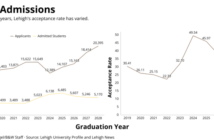More than 80 percent of Lehigh faculty members who have donated to a political party or presidential campaign have given to the Democratic National Committee or to the campaigns of Democratic presidential candidates, according to data from the Federal Election Commission.
Lehigh professors have donated $30,588 to presidential candidates, political parties and joint fundraising committees associated with specific presidential tickets since the 2000 election, and only 16.8 percent of that has been donated to Republican presidential candidates or the Republican National Committee.
Twenty-eight faculty donors have made 26 donations to political parties and 53 donations to specific presidential candidates since the 2000 election cycle, with a combined $5,800 going to the Democratic National Committee and $1,750 going to the Republican National Committee. They have contributed a combined $22,388 to Democratic presidential candidates and a combined $3,400 to Republican presidential candidates since 2000. One donation of $250 was made in 2000 to Ralph Nader, a Green Party presidential candidate, and no donations have been made by professors to independent presidential candidates.
“Faculties are notoriously progressive and liberal,” said John Ochs, a mechanical engineering professor and the director of the technical entrepreneurship program, who has donated $1,400 to the Democratic National Committee since July. “It’s a bias the Republicans and conservatives have often complained about. Higher education are bastions for liberalism and liberals in general.”
Almost half of the donations were given leading up to the 2012 election, and $11,738 — or 80 percent of the contributions before the election — was given to Obama for America and the Obama Victory Fund 2012. Saladin Ambar, a political science professor who studies the American presidency, said Obama’s “historic presidency” as the first African-American president was likely part of the reason Lehigh faculty donated the most money during this election season.
Donations from individuals who listed Lehigh University as their employer and have taught or are teaching at Lehigh were recorded for this analysis. Ambar said those who donate to presidential campaigns tend to be middle or upper-middle class individuals who follow politics closely. He said donors are traditionally college-educated and have large sums of money to donate, but there has been a movement to encourage smaller donations to campaigns. Democratic presidential candidate Bernie Sanders has said the average donation his campaign receives is $27.
“We are, because of the Internet, seeing a transition away from the purely well off or affluent donor to smaller donors, and it’s become easier for people with less means to donate, as Bernie Sanders has shown,” Ambar said. “I think that has helped level the playing field somewhat, but it’s still a system dominated not just by corporations, but also by affluent individuals who can give more readily to candidates.”
The Federal Elections Commission discloses donations above $200, so any contribution made by a professor under $200 would not be in the database.
The average donation was $387, with the median donation at $250. Three professors from the College of Business and Economics donated to a political party or presidential campaign in the past 16 years, as did three from the College of Education, four professors from the P.C. Rossin College of Engineering and Applied Sciences and 18 from the College of Arts and Sciences.
Individuals in the College of Arts and Science and the College of Education have not made any contributions to Republican entities in the past 16 years. Three donations from a professor in the P.C. Rossin College of Engineering and Applied Sciences totaling $1,000 were made to the Republican National Committee, and two professors in the College of Business and Economics donated a combined $4,150 to Republican presidential candidates and the Republican National Committee, which is the largest combined donation to a Republican entity from professors in any one college.
Both Ambar and Ted Morgan, a political science professor who has donated to Bernie Sanders presidential campaign this election, said professors of the humanities and liberal arts at universities across the country tend to lean more to the left, and business faculty tend to be more centrist or lean to the right. Ambar also said higher-educated voters and individuals with Ph.D.s have traditionally voted Democratic, especially in the Northeast.
“I think Democrats historically have been the party of education in this country and have tended to support larger resources from the federal government to be directed toward education, including at the college level,” Ambar said. “And I think this has been sort of a natural marriage if you will between Democrats and professors in that way, but a lot depends on what part of the country you’re talking about.”
The number of contributions from faculty members at Lehigh is relatively low, especially compared to Ivy League institutions and other top-ranking universities. Morgan described the political climate on campus as “quiet,” and Ambar said the lack of donations may be a result of the “apolitical atmosphere” and “insular community” on campus and in the surrounding area.
“Not that politics doesn’t take place here or that there aren’t people here without strong views, but compared to other schools, Lehigh has a reputation for being less political — and that’s true probably for it’s undergraduates but also likely true for its professors,” Ambar said.
Morgan said he believes some faculty members are politically involved, but not as many contribute to political campaigns compared to other institutions because of the Lehigh bubble. He also said not all those who are politically involved choose to donate to a campaign or party.
Kenneth Brill, ’17, the president of College Democrats, said he believes the most common political stance of students on campus is apathy. He said he believes students care about local and national issues but they choose to ignore them.
Barrett Miller, ’16, the president of College Republicans, said he would like to see more political discussion incorporated to classes that are not inherently political. He said most funding for scientific research is funded by the government, so he believes the connection between politics and funding for projects should be discussed in science classes.
While donations indicate the Lehigh faculty as a whole leans to the left, Brill said he does not believe this affects a professor’s teaching style. He said he was not aware his economics professor, Frank Gunter, was involved with College Republicans from listening to his lectures. Brill did not learn that Gunter, who has donated to the Republican National Committee as well as Republican presidential candidates, was a Republican until he became more involved with College Democrats.
Miller said he has noticed his professor’s liberal leanings outside of the classroom through one-on-one conversations and things such as bumper stickers on their cars and posters on their office doors, but he does not feel these beliefs seep into the classroom too often.
Ochs, Ambar and Morgan all agreed that professors bring their own ideas and beliefs into the classroom, just as students do, and Morgan said it is best for professors to be open about their views.
Ochs said he expresses his political views in his classes and encourages students to “fight or argue with facts” when discussing political topics.
Ambar said he believes it is impossible for anyone to be “100 percent impartial,” and it is best for those in a classroom to discuss these views in a productive manner. Ambar and Morgan both said professors should acknowledge when they have some sort of bias but also should let students know they are not expected to agree with these views.
“It’s less transparent what those (beliefs) are if you try and hide that,” Morgan said. “It’s still there. That is, if you profess neutrality between position A and position B, that itself is expressing there is the range of viewpoints that I consider valid for you to consider. So I’ve always believed, in my field anyway, that a professor can and should be honest about their own inclinations but make clear that it’s not what they’re expecting students to absorb.”





Comment policy
Comments posted to The Brown and White website are reviewed by a moderator before being approved. Incendiary speech or harassing language, including comments targeted at individuals, may be deemed unacceptable and not published. Spam and other soliciting will also be declined.
The Brown and White also reserves the right to not publish entirely anonymous comments.